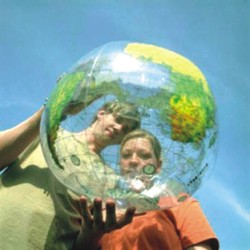Reflections
Bideshi Blues
Andrew Morris
 It was just an off-hand remark pretty standard fare amongst such circles. I was sitting with a twenty-something audience member after a performance by our jazz duo BlueNote. The scene: an expat club. Balmy evening air, tinkling glasses, the chatter of people looking forward to the weekend after a busy week at work. To make polite conversation, I asked her how long she'd been here, and whether she was enjoying it? “Oh you know” she replied, “it has its moments. Up days and down days. But it's also really nice to be able to come in here and escape from Bangladesh.” It may be that she was merely talking about the traffic, or the noise, but people rarely stop to specify. It's the whole shebang that needs escaping from, it seems. It was just an off-hand remark pretty standard fare amongst such circles. I was sitting with a twenty-something audience member after a performance by our jazz duo BlueNote. The scene: an expat club. Balmy evening air, tinkling glasses, the chatter of people looking forward to the weekend after a busy week at work. To make polite conversation, I asked her how long she'd been here, and whether she was enjoying it? “Oh you know” she replied, “it has its moments. Up days and down days. But it's also really nice to be able to come in here and escape from Bangladesh.” It may be that she was merely talking about the traffic, or the noise, but people rarely stop to specify. It's the whole shebang that needs escaping from, it seems.
Once I would have been eye-poppingly outraged by such a comment the casual contempt it implied, and the automatic (and in this case entirely mistaken) assumption that I as another foreigner would agree without hesitation. But now I just feel weary, and rather saddened by this common sentiment, which echoes with so much missed opportunity. Much as I was when someone asked me recently how long I had to go on my contract. I said something like “Just over a year”, and his spontaneous and utterly sincere response was “Oh, not too bad then”, as if it was Alcatraz, not Dhaka I was describing.
What is it that goes wrong? Why is it that such statements can be heard so easily? In my probably over-simplistic and utterly unscientific observation of the expat community here, we foreigners seem to divide into two groups. There is the hapless majority, for whom life in Bangladesh does indeed seem to be a jail sentence. One of the foreign communities ran a monthly magazine not too many years ago called, without irony, the “Hardship Post”, which they would read while undergoing the incontestable hardship of sunbathing at the poolside, gin and tonic in hand. A spell in Somalia or in Darfur would soon have put them right.
This majority spans all age groups, keeps to the clubs or to each other's houses, and manages to generate a never-ending source of complaints about the country. It's too hot, too corrupt. There's too much poverty. It's impossible to work here and so on and so on… until the listener's eyelids grow heavy in the afternoon heat and begin to droop. These comments usually blithely ignore the poverty, the social deprivation, the corruption and the inequalities in the societies we have left behind. Even the young techno-savvy generation of expats seem happy to tap into this sentiment in their websites. With one or two notable exceptions, most blogs seem to cry out “It's exotic! It's weird! Look at heroic me living this life of adventure in this land full of chaos!”
Of course, cultural difference is always going to be a challenge. Moving from a society with one set of values into another with an entirely different outlook and set of norms, not to mention professional differences, is never easy, and takes understanding and patience, much as it would for any Bangladeshi setting off into the countries we all come from. And there will be moments in the life of any exile when things all seem to go wrong, and the host country itself becomes a convenient scapegoat. These periods are inevitable, and need to be accepted, but they can't be allowed to pass for truths about the country they are little more than a reflection of the state of mind we are going through at the time.
And state of mind is the key. The second, smaller group of foreigners here is made up of those who have managed to integrate to some extent. They have tailored their expectations and learned to embrace diversity. Again, this group spans all ages I have seen young people here who have adopted a positive attitude in this, their first overseas job, and met many admirable people from older generations who have lived here happily for decades.
 Above all, this second group seems to have learned to look beyond surface problems and understood what is Bangladesh's greatest asset: its people. If it's great architecture you want, try Paris. If it's an abundance of classical culture, you may well be better off in Vienna. If it's pizzazz and excitement, perhaps Manhattan may suit you more. But if you are interested in community, in forming close and personal friendships, I can't think of a better place than this. And this is perhaps the real key to the second group --they are all people (whisper it) with Bangladeshi friends. Above all, this second group seems to have learned to look beyond surface problems and understood what is Bangladesh's greatest asset: its people. If it's great architecture you want, try Paris. If it's an abundance of classical culture, you may well be better off in Vienna. If it's pizzazz and excitement, perhaps Manhattan may suit you more. But if you are interested in community, in forming close and personal friendships, I can't think of a better place than this. And this is perhaps the real key to the second group --they are all people (whisper it) with Bangladeshi friends.
Within two weeks of arriving here some years ago, a grizzled old expat at one of these clubs took me to one side and told me “It's impossible to make friends with Bangladeshis. It just can't be done.” At the time I had no way of knowing whether this was advice borne of wisdom or ignorance. Now I know of course that it was complete rubbish. There is a whole group of fascinating people of all ages in this country who are open and willing to share their time with foreigners. Among my very closest friends here are a photographer, a journalist, an architect, a lecturer, a writer and a musician, all with wide experience of the world, all able to explain and analyse their own country, willing to teach and to learn, to relax and have fun, and simply to hang out.
Admittedly there is one practical problem of course. How does the expat in search of friends begin to go out and meet equally open Bangladeshis? Communities form organically and slowly not necessarily overnight. So can we kick-start the process? Perhaps issue t-shirts with the slogan “Be my friend” or “Hug me” to all interested parties? A friendship club at Coffee World? Perhaps not it's just a question of being open, accepting invitations and following through on opportunities, and waiting for a network to build. If the will is there, it can be done…
As it happens my friends and I mostly speak in English (although occasionally lapsing into Bangla). At one stage in my life, I would have thought knowledge of the local language an absolute prerequisite for a fulfilling existence overseas. I'd probably still stand by that, but at the same time recognise that for many there is simply no time to engage fully with a new and very different language, although I do think that learning to say “how are you?” and count to three ought to be possible for the high-powered expats who pitch up here.
On the other hand I've seen one or two foreigners in my time who were fluent in Bangla but simply used it to screech at everyone who crossed their path. So clearly the language isn't enough by itself. Attitude is something which is deeper and more important than linguistic fluency: something I first caught a glimpse of during an enlightening conversation some years ago, which reverberates in my mind to this day.
Back in 1998, during my first stay in Bangladesh I was having a long discussion with my wise old boss, T, on this very theme of whether we should learn the language of the countries we live in. With all the force of youth, I was adamant that this was essential. T, having learnt about 2 words of Bangla in 2 years, was not about to agree. At one stage in our discussion, I mentioned an incident in which the grandfather of a family I'd visited had read me his poems in Bangla. I'd only vaguely understood the poetic Bangla of course, but surely that would never have happened at all without having learnt the language? And then T came up with this unforgettable pearl, which punctured my pride but taught me a lifelong lesson. "You're missing the point, Andrew", he told me. "The thing isn't whether you learn the language or not, but to be the kind of person someone would want to read their poems to in the first place".
Copyright (R) thedailystar.net 2007 |
